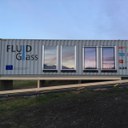Introduction
The heavy use of energy from non-renewable resources is one of the biggest problems of our time. Efficient use of energy is becoming more relevant than ever, and it must be implemented in all sectors of human activity.
The highest contributor to the generation of Green House Gases is the creation and operation of built environment. The average value is estimated in most developed countries at close to 33%, knowing that around 40% of the total energy use corresponds to buildings, while their fossil fuel heating represents a major share. Consequently, the built environment in Europe needs to be designed, built, operated and refurbished with much higher energy efficiency.
Project description
A new and innovative concept of solar thermal façades will be developed in FLUIDGLASS project for use at building and district level, increasing flexibility and energy efficiency. Liquid will be circulated in spaces of transparent window panes, transforming passive façades into active collectors that are capable to react on changing interior and exterior environmental conditions. This opens new routes of advanced thermal building management embedded in energy networks at district level to significantly improve the thermal
performance of the building envelope and the comfort for the user.
The main objectives of FLUIDGLASS are as following:
- to design and develop an easy to install modular frame system;
- to develop a fully automatic device to control the transmittance of energy-absorbing fluid;
- to integrate the FLUIDGLASS system into the HVAC system and increase the use of renewable energy at building and district level via advanced thermal management capabilities;
- to deploy and demonstrate the whole system under real conditions in geographical locations with different exposure scenarios in hot and cold climate;
- to assess the implications of such a system from an economical and legal point of view and demonstrate its economic benefits.
The collector panel is a combination of fluid and glass layers and a thermal barrier. In this way an optimized configuration of the layers can be assembled for different applications and different sections of the building envelope. The basic element of FLUIDGLASS remains the same, but the combination of the different layers allows wide applicability and simple production process. For example: Shading can be provided by tinted glass or fluid (fixed or adjustable). This modular approach has the advantage to offer customized panels depending on the user’s need.
In the most advanced approach, two fluid filled layers are implemented in the glass façade. These two layers regulating all energy flow within the façade. The fluid layer to the interior space keeps the inside surface temperature just below or above room temperature for heating and cooling, while the liquid layer to the exterior controls the energy transmission by absorption of the solar irradiation.
Expected impact
FLUIDGLASS proposes a disruptive innovation in façade systems - transparent solar thermal façade system combining solar thermal collector, insulation glazing, shading device and heating/cooling panel in one element. This unique system will not only offer a better performance characteristics than competing products, moreover it will be the only solution for a large number of glazed buildings where opaque collectors cannot be installed due to aesthetics, usage or construction type reasons. Since FLUIDGLASS allows all these additional buildings to become potentially net-zero in heating and cooling, the macro economic impact is by far higher than the impact of competing approaches, which only offer slight efficiency improvements for existing solutions.
First assessments show that FLUIDGLASS can increase the thermal performance of the whole building resulting in energy savings potential of 50%-70% for retrofitting and 20%-30% for new low energy buildings while the comfort for the user is significantly improved at the same time.
Contacts
Project Coordinator
Prof. Dipl.-Arch. ETH/SIA Dietrich Schwarz
University of Liechtenstein
dietrich.schwarz@uni.li
Project Manager
Václav SMÍTKA, PhD.
AMIRES s.r.o.
smitka@amires.eu
Website
www.fluidglass.eu
Consortium
Universität Liechtenstein, Liechtenstein
Mayer Glastechnik GmbH, Austria
NTB Buchs, Switzerland
Tech. Univ. München, Germany
GlassX AG, Switzerland
Hoval AG, Liechtenstein
CEA-INES, France
Universität Stuttgart, Germany
Cyprus R&I Center, Cyprus
ALCOA Europe Commercial, France
AMIRES s.r.o., Czechia
